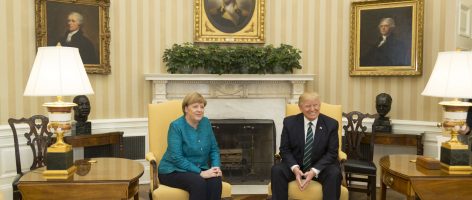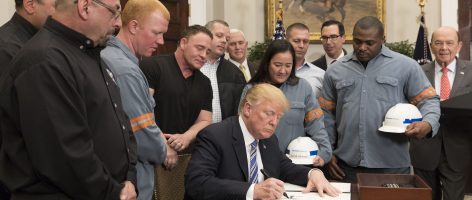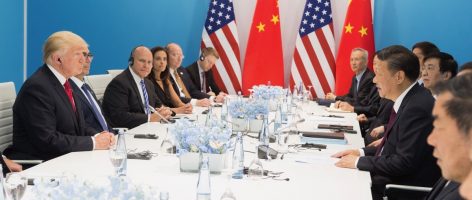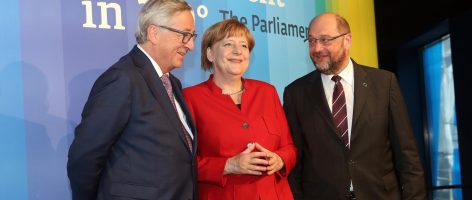
Merkel can make her second Trump visit a success
German Chancellor Angela Merkel, who meets with Donald Trump next Friday, hopes to improve on their inaugural tête-à-tête in March 2017 when the U.S. president appeared to withhold shaking her hand during an Oval Office …
How Germany can reframe the US-China trade debate
By Peter Rashish in Handelsblatt Global on April 4, 2018.

National Myths are an Unreliable Guide to Trade Policy
March Madness: it would be tempting to describe recent U.S. trade policy that way. First, the Trump administration imposed tariffs of 25 percent on U.S. steel imports and 15 percent …

Steel Tariffs are a Distraction from Transatlantic Cooperation on China
The White House’s decision on March 8th to impose tariffs on imported steel and aluminum is not without precedent: President George W. Bush did something similar in 2002 when there …

Trump’s Tariff Policy Present – and Yet-to-Come
Trump Rescinds Steel, Aluminum Tariffs Amid Concerns for Auto, Construction Industries Washington, December 20, 2019 – Stating that he wanted to avoid “too much of a good thing” for …
„Die EU sollte sich nicht provozieren lassen“
Der US-Handelsexperte Peter S. Rashish über Trumps Strafzoll-Drohungen und die Folgen. Featuring Peter Rashish with the Sächsische Zeitung on March 3, 2018.
Mehr als jeder zweite Deutsche hält Beziehung zu USA für zerrüttet
Featuring Peter Rashish via Handelsblatt on February 28, 2018.

U.S. Trade Policy: Clearing the Brush – or Pulling up Stakes?
The Trump administration has been in office for a little over a year now, and it is becoming clear there are two ways to view its approach to trade policy. …

For Germany’s Social Democrats, a Chance to be Europe’s Superman
It was 80 years ago this year that DC Comics first published Superman, and with this comic book series launched a franchise of superheroes that shows no sign of losing …
The National Security Strategy: Symbolism vs. Substance
The National Security Strategy (NSS) released by the White House this week—the only time in the first year of a new presidency—is a sober and realistic assessment of the state …

The G20 Trifecta
Germany – Argentina – Japan: Not a list of three regional soccer powerhouses, but rather the troika of past, current, and future presidency countries of the G20. On December 1, …
German Economic Leadership in Europe: More Uncertain and More Needed
The instability produced by the failure to form a so-called “Jamaica” coalition in Germany increases the importance of moving from reliance on de facto German leadership of the Eurozone to …




